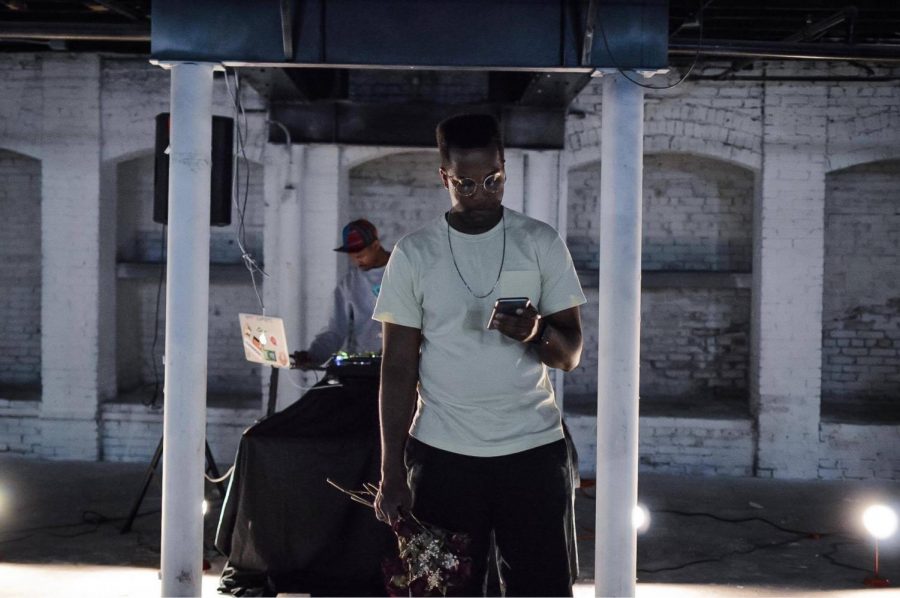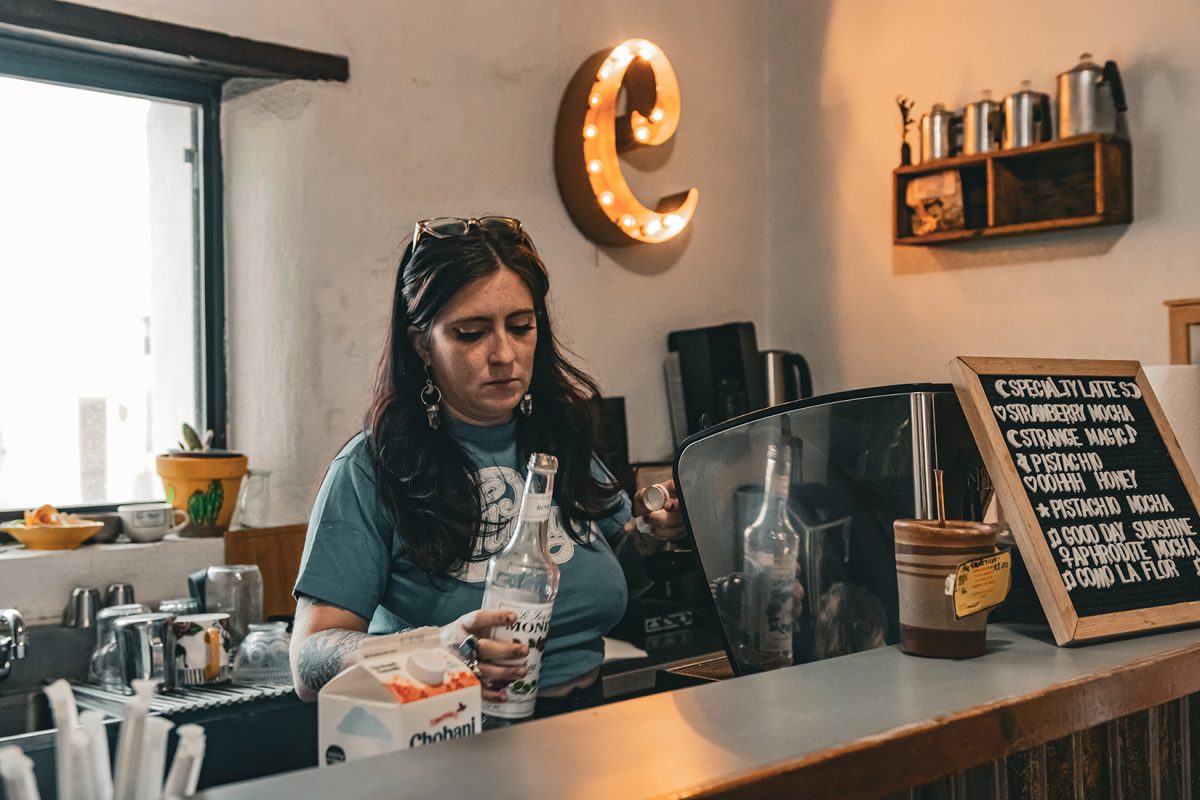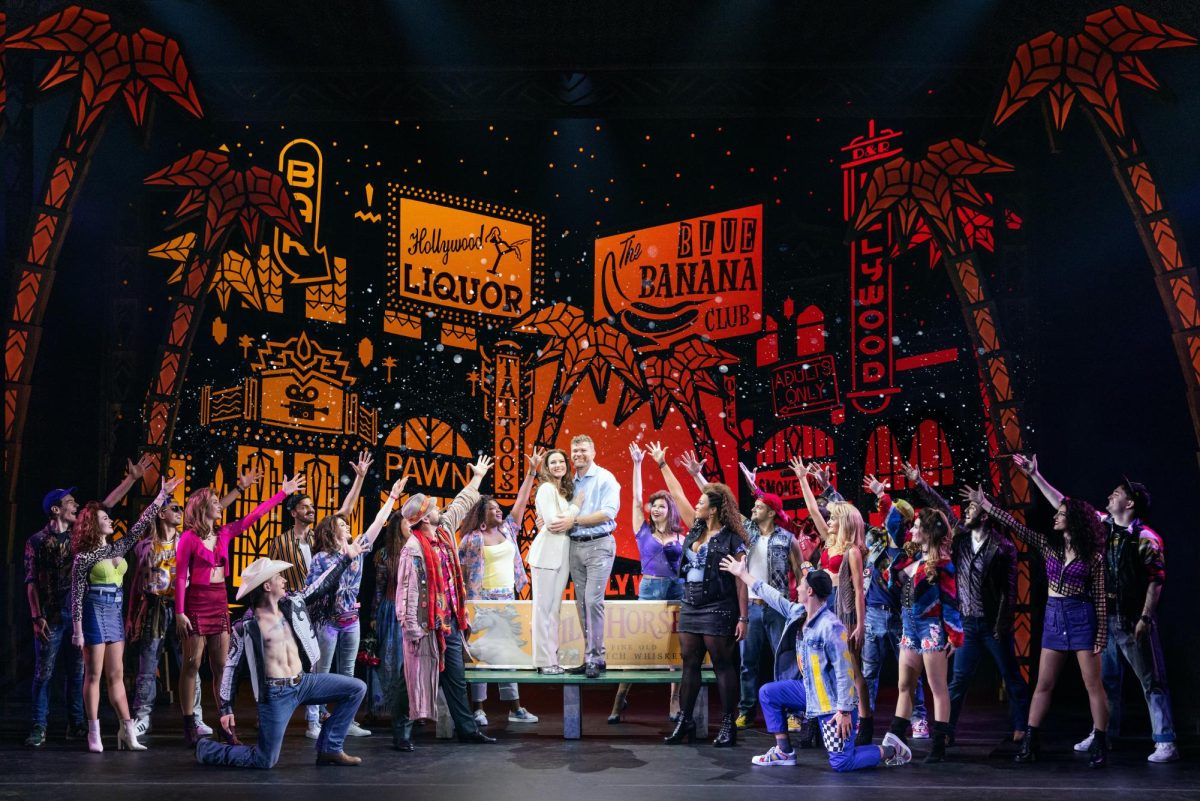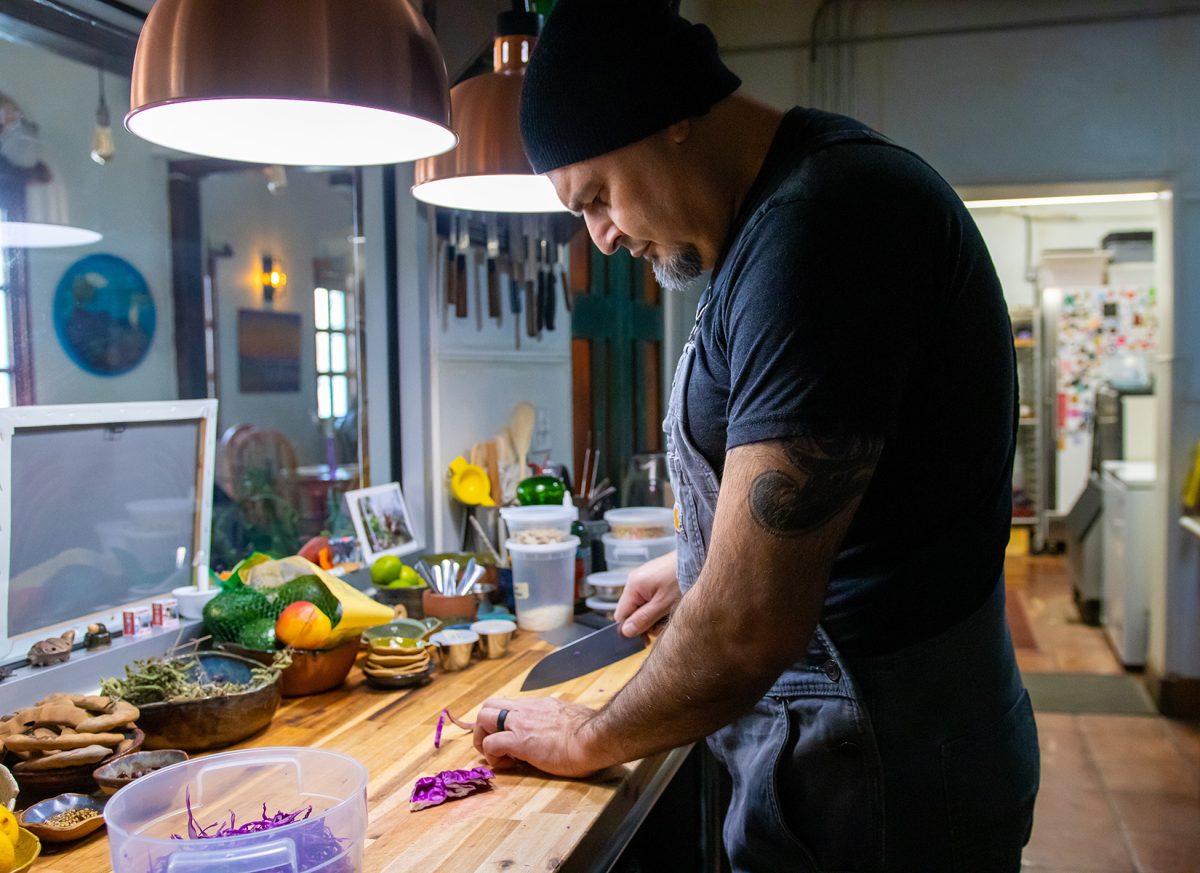Myke Joyner, better known by his stage name, The Fifth Estate, has been growing his local listenership across El Paso and is best known for his traditional hip-hop sound. Recently, Joyner dropped his newest mixtape, “Stuck in the 90s,” and The Prospector was able to visit with him to discuss his newest record.
Q: First off, the cover for “Stuck in the 90s” really pops off of the page and captures all ‘90’s colors and details. How hard was it to perfect a cover like this? It seems like it was really thought out. What was the process like to make it?
A: It was a difficult process only because I struggled with a way to accurately embody the cover art concept without being really corny. I hate corny tributes. I wanted to pay my respect and also respect the music and myself. I worked with Yukari Ochi on the cover and she was able to help me turn my ideas into reality. After the foundation was laid, the rest was easy. We hit a lot of staple ‘90’s items. Sonic, the cassette tape and the “Yo! MTV Raps” tributes on the cover are my favorite. It was really fun to do overall and I love it.
Q: On “I Am,” the album’s opening track, you use love as a metaphor to kind of give an introspective take on who you are. You say you feel the best you ever felt before. Why do you say that? Does being at such a great place in life help give this album extra flavor?
A: “I Am” is really personal because it’s the summation of a lot of garbage things that have happened to me in the past. It was a total and triumphant release. I let go of the really bad feelings I’d been harboring towards the people or things that had come against me and decided to use that energy constructively. The positivity in my life absolutely helps give more flavor to this project because I involved so many new people that I’ve met within the past year.
Q: “What is it?” feels like a homage to some great East Coast rap. Was that how you modeled it? Or was it kind of like a blend of different inspirations?
A: This song is 100 percent ATCQ (A Tribe Called Quest) inspired. They’ll forever be one of the best hip-hop acts of all time. Although I was raised in the Southwest and West Coast, my time in college on the East Coast really helped to shape my outlook and sound in music. I draw inspiration from a lot of different places, but in the wake of Phife Dawg’s passing and the new album last year, ATCQ continues to help me elevate my sound.
Q: “Soul” has such a nice vibe with an old-school hip-hop hook, unlike what we see in today’s hip-hop scene. What do you think of the rap world today? How has it evolved? Do you see yourself fitting in it or actually stuck in the ‘90s?
A: I think rap is the most eclectic that it’s ever been and oversaturated at the same time. That’s what makes it exciting to me though. I continually look around me and learn from the different types of hip-hop/rap out there in order to keep my sword sharp. It’s a place of constant growth and reevaluation. “Stuck in the 90s” isn’t supposed to be a hip-hop purist-type of sentiment, but rather an open commentary on the era that raised me. I’m ‘90s influenced, through and through. I’m very much so a modern artist at the same time. You’ll see this over time.
Q: You take a faster rap style on “All I Need” and “Go in Peace.” Have you ever performed these songs live? It seems like a mouthful and it would make you totally out of breath at the end. This truly seems like a song that would excel seeing them live. Do you try to make songs that would be good seeing live? Or does it just transition that way?
A: I’ve done “Go in Peace” at multiple shows this year and it’s one of my favorites to do. I’ve never performed “All I Need” live, but I will for the right venue and audience. I just make songs for what they are in the moment. My approach to live performances is entirely different, however. I deliberately focus on the sequencing of my songs and how I can bring them to life for the audience. I don’t ever want to give you what you’re going to hear on SoundCloud or Spotify. That would defeat the purpose of seeing me live. I try to bring the songs to life and help you connect.
Q: I’m a huge fan of transition rap songs, like on “WARGAMES/Eye (dea)’s Bathroom Floor.” What inspiration did you bring into this track? So much seems to be going on in this song, what is this song about?
A: “WARGAMES” is about fighting for authenticity in this rap world and ultimately calling out those that fake the funk. It’s very easy for artists to see who’s just trying to fit a style or steez just to fit in and get popular. It also serves as a subtle message to anyone that I can and will rap you under the table. It just is what it is. “Eye(dea)’s Bathroom Floor” is a direct juxtaposition to “WARGAMES.” The former is very braggadocios and confident…EBF deals with a lot of my open reflection on the past two years of my life and how I’ve had to learn to deal with depression in its various forms. I just try to keep my head above water at all times.
Q: The album generally has a positive tone, but “Melancholy Rose” takes a different tone. Was it intentional to kind of take a break in the midst of the wavy album and bring this song in? What was making that song like?
A: Sequencing, sequencing, sequencing is really important. I don’t think that I have it mastered, but you’ve got to lead people on a journey when it comes to full projects, especially one of this length. I think I introduced that song at the best point possible during the mixtape. In full transparency, the song is about a past relationship and my continued struggle with the concept of love and what purpose I felt it served. The song came to me surprisingly quickly as I wrote it on an airplane, flying back into El Paso last December.
Q: “Back Home” has some great lines, especially about the feeling of coming back home. How does it feel coming back home to El Paso? What is it about the city that draws you? You also talk about dark times you endured. How hard is that to talk about on a tape?
A: I moved to El Paso in the fall of 2013 and it quickly became home. It’ll be a part of me for the rest of my life, regardless of where I choose to truly settle down. The thing that I love the most about EP is the untapped potential mixed with the growth that I’ve seen the city make over the past four years. El Paso is a significant part of my early, post-college and adult life. It’s hard to talk about hard times on a record because I feel like I never fully convey how I’m feeling. I feel like most artists just want to be understood as they intend it but I’ve come to accept that talking about my hard times are therapeutic and could possibly be the same for other people however they receive the music.
Q: “Ambition” is my favorite production in the album by m o o n. Who is moon and how key was he to this album?
A: m o o n is one of my best friends and my right-hand man when it comes to this music. He and I met during our junior year of college and were fast friends. He’s one of my biggest supporters and also one of my realest critics. He and I shaped this mixtape together and he should absolutely be considered an executive producer. He’s family.
Q: “Manifest” sounds like straight out of a 2011 Pro Era album or something from the underground East Coast hip-hop scene. Who influences you most in today’s music world? What about from the ‘90s, who influenced you the most?
A: I think that boom-bap sound influenced me the most and that’s what “Manifest” is–boom-bap all the way. The funniest part about this record is that m o o n and I had a lot of disagreements on the execution of the song, but it’s found itself the favorite of a bunch of people. OneManJazz added in the cuts that you hear and really helped to round out the record by the time it was done.
Q: “EfYooSiKay” sounds a little aggressive and frankly pissed off. Did you write this mad? Looking back, is it cool that you can express all feelings on this album—mad, happy, down, excited, ambitious, etc.? That seems like a true talent to have as an artist.
A: Yo, I wrote this song while sleep deprived and recorded it while drunk. While I’m not exactly proud of it, it was necessary for the moment. Life and people were really getting the best of me. I had to let it out. It was the very first song completed for this project and wasn’t ultimately intended for release. “Stuck in the 90s” ultimately became a tool to get out my varying emotions and grow.
Q: You talk to yourself on “Keep Ya Head Up” and try to keep yourself positive. How hard is it to be positive in today’s world? How do you hope a song like this can help someone else listening who might be going through what you’re going through on this?
A: It gets hard sometimes because you can’t really control what comes at you, only how you react to it. I wrote this song to help the people around me and to be a constant reminder that, despite it all, everything is going to be all right. When people hear this song I hope that they can feel the sincerity. I think that one of the worst things you can be while feeling down or sad is alone. That feeling of loneliness can wreck you. I think we all need someone so I want that song to serve as a companion when you can’t find yourself around friends or loved ones.
Q: An album’s outro is almost as important as the intro. On “People Under the Stairs” you reflect on the whole album, who you are as an artist and everything surrounding your music career. Now looking back, do you think you included everything you wanted on this outro? How did this track bring the record full circle?
A: To be honest, if I’d had it my way (with all of the resources) this song probably would’ve been about eight minutes long. Most people don’t know that I’m a musician and play a few different instruments as well as writing lyrics and recording vocals. I wrote and performed all of the trumpet arrangements for the entire mixtape. I originally wanted a feel with a full band and maybe I’ll see that dream realized soon, but the finished product was still really great and I’m really happy with the way it turned out. The song is based on a hip-hop group from LA called, People Under the Stairs. The chorus is borrowed from their song “Days Like This” and my version is just my take on their overall sentiment.”
Q: Lastly, is there anything you want to add about “Stuck In the 90s?” What were your favorite things about the ‘90s? If you could describe this album in three words, what would it be?
“I think luckily the mixtape really does speak for itself and it’s a great introduction to people that don’t know me. The ‘90s meant a lot to me, but really just embody how simple stuff once was. I loved the whole ‘90’s culture from the cartoons to the music and movies. It’s not just golden era hip-hop that makes me nostalgic but rather all of the toys, shows, moments and experiences that the ‘90s brought me. “Stuck in the 90s” can be summed up in these three words: positivity, reflection and growth. Those are three important things to me that I feel are alive in every song on the project.
The Fifth Estate will be performing live at Prickly Elder on Dec. 9. Tickets are on sale at eventbrite.com.
Follow Adrian Broaddus on Twitter @adrian_broaddus.





